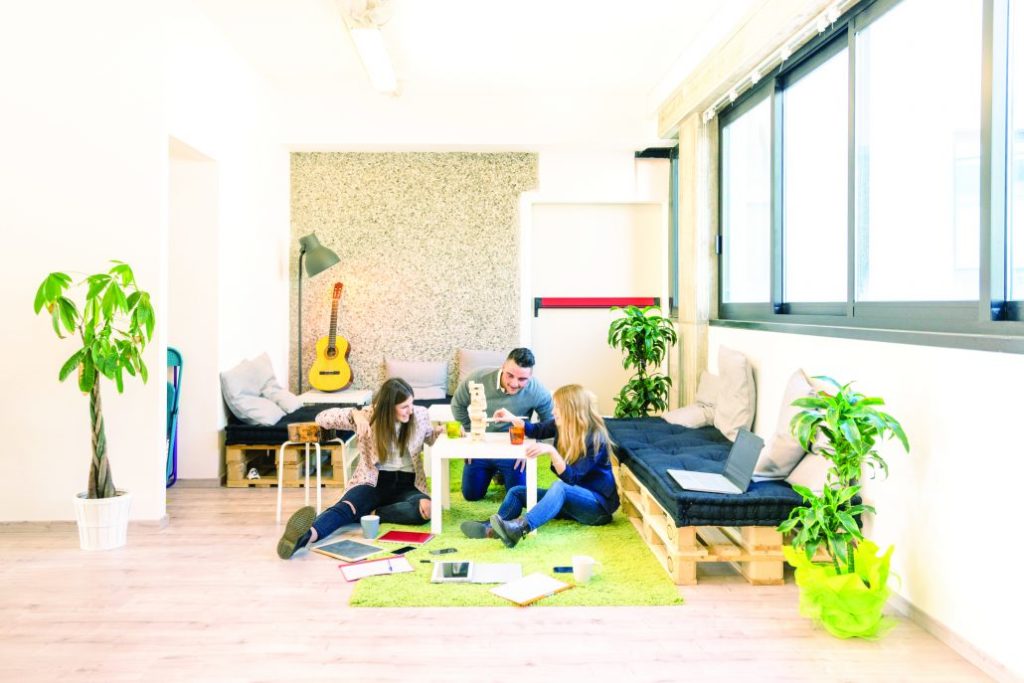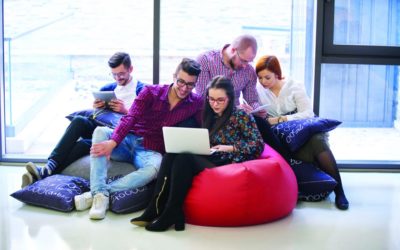State of mind
We cannot work today as we did yesterday. Digital imposes and allows mobility. Globalisation has created a breath of fresh air for differentiation and personalisation. And man, in all this, makes his fulfilment the sine qua non condition to his actions, and therefore to his work. As a result, workplaces are dusted off and smart office becomes a state of mind. The interest of the closed offices, often inheritance of an era of the statute or synonyms of closets socially mortified, is questioned. In fact, 93% of young workers no longer want a traditional office.
Flex office: think space in 4D
In the wake of these collaborative spaces, companies are moving towards a more dynamic organisation of their environment, a characteristic of what is now known as Flex Office.
A logic which is not limited to the optimisation of square meters but invites us to take into consideration the working environment in its useful dimension, its mobility dimension and its collective and individual dimensions. In order to promote all the uses and allow the accomplishment of the various missions of the teams, spaces are therefore organised by activity: boxes or library rooms for individual work in tranquillity, meeting rooms of different dimensions equipped for work mode project or customer reception, spaces for more informal conversation in a “room” spirit, or relaxation rooms, sports, cafeterias…
The idea is to make space a facilitator. “Our new premises extend over 1400 m2 spread over two horizontal spaces and offering a breath-taking view of the Sacré Coeur, describes Laure Lefebvre, co-founder and CEO of Minutebuzz, 100% video and positive media for Millennials, and accessible on social networks. Each has an individual locker and a laptop for easy movement on both spaces. Each day, our 70 employees have the opportunity to choose where to settle, and to sit in a hundred different ways, a little bit standing, a little bit sitting, on sofas, stools, chairs with different tables.”
Still in Paris, in the new space of Strasbourg Saint-Denis, which has been occupied by the start-up company Stootie since April 2017, the configuration is very different. “We are not officially in Flex Office because our 45 employees have allocated offices and the space is still organized in teams. So the developers have a floor. The communication somehow has its floor…, says Marie-Béatrice Dumas, Office and Happiness Manager of this young shoot, pioneer of the application of sharing of competences and services of the same name. In fact, our offices are a bit special,” she continues.
These two examples therefore highlight similarities. The space is “divided” for different uses and needs. It integrates digital solutions for the employee to be connected and mobile at any time. And its use is left to the free choice of workers. But “it’s not a summer camp,” assures Stootie’s Office and Happiness Manager. Everybody works. But everybody can equally take a break when they want in order to play table football or rest a few moments. In fact, conveying shared trust is our desire. Everyone is empowered. When people feel more free and non-infantilised, they create and think better.”
From Flex office to smart office: the premium experience
On the other hand, the installations depend on the surface, and especially on the trades and the links that are made daily in the teams. “It cannot be reduced t “I saw this at a friend’s house and I’m going to do the same thing”, says the co-founder of Minutebuzz. We must really adapt according to current and future needs, digital uses, individual and team.” Everyone has to find the right layout and the right collective rules that go with it.
For in order to be successful, any redesigned working environment must be adapted to the men who occupy it and the working culture that a company wants to breathe. If it is only a question of reorganising the space, modifying the furniture and eliminating the individual offices, without modifying the decision making, the collective modes of functioning and the granting of autonomy necessary for the mobility and the confidence of collaborators, there is no need to change. In this light, the notion of Smart Office is more accurate and more transformative than that of Flex Office.
Here, the work environment is centered on human to increase his development and his commitment. The development of positions of Chief Happiness Officer, or Office and Happiness Manager, also corresponds to this desire to put space at the employee’s service and not the contrary, by creating a happy work experience. “The CHO is the guarantor of the experience the employee will experience in the company in which he operates. He will provide tools, services, ways of working modeled on his needs,” says Olivier Toussaint, co-founder of the Club of Chief Happiness Officers and CEO of optimisme.com.
Also, Marie-Béatrice Dumas defines herself as a “facilitator of life at work“: “I am here to convey a state of mind of benevolence and well-being and to ensure that each member of the team appropriates this state of mind. This involves listening, creating spaces that are conducive to calm or conviviality, or events that might seem like they have nothing to do with work “. In the workplace, this translates into a more dynamic layout, more differentiated furniture, but also and especially shared moments.
At Stootie, in addition to the organisation of a yoga class twice a week, employees will soon be able to choose to attend awakening and muscle building sessions. On their working time, Marie-Béatrice Dumas, also organises workshops or conferences to boost their performance. “For instance, we will bring a life coach to talk about one or two hours of stress management. A dietician to explain us the benefits of a healthy breakfast to boost our days in terms of energy,” says the guarantor of the well-being of teams Stootie.
Any architects of the reenchanted work?
In the end, controled by the human being, the layout of a new work environment will coincide with a certain liberation of the company. “It’s about making sure that the employee is himself an actor in the life and culture of the company in which he works. Also, the CHO’s role will equally be give him more responsibilities to empower him“, continues Olivier Toussaint. “The result of all this work of transformation at home is that the environment is much more alive. We let the potentials express much more freely. And if we add custom furniture and the adequate brightness, we feel like to be in our home. The workplace becomes a place of life“, rejoices Laure Lefebvre.
Finally, the Smart Office becomes intelligible for the collaborator and comes to crumble a little more the border between professional life and personal life. “Some might decry it, but I, on the contrary, find it quite healthy. Breaking this barrier does not prevent you from having your private sphere, your little habits, but it is good to pass through the door of the company knowing that you can be yourself,” observes Olivier Toussaint.
Its diffusion is therefore at work. It is all the more essential that in the future, many tasks will be performed by a robot or an algorithm, adds Olivier Toussaint: “Beyond the issues of the company’s seduction and quality of life at work, the fact of taking care of employees, fostering their creativity and taking into account their emotional intelligence, is also a way of ensuring that they remain competitive and motivated tomorrow while facing the machine “.



